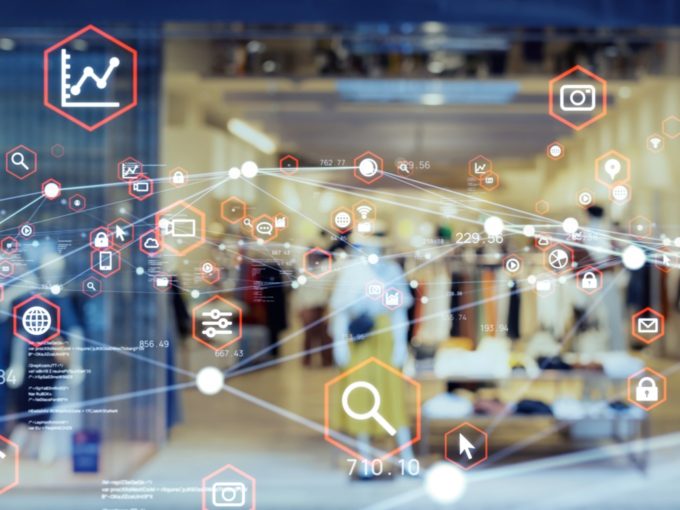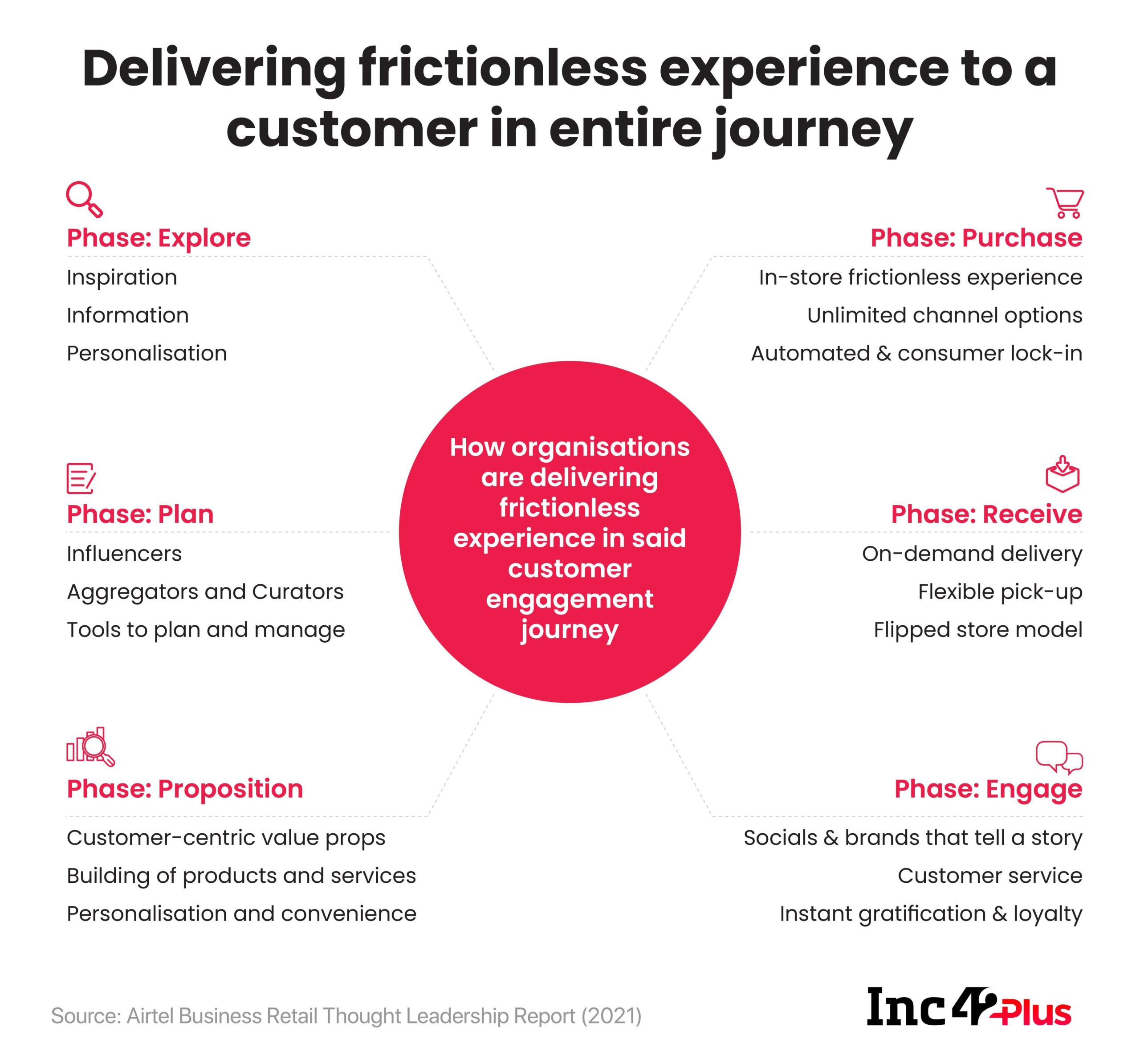The opportunity to disrupt the retail market is unprecedented for startups. Those with a passion for products have dug deep and created delightful product experiences to fill online retail shelves
Necessities (grocery, medicine) will become extremely digital and hyperlocal with retailers delivering products under 30 minutes, while “want” categories such as clothes, accessories will become phygital but highly differentiated by high-end services
Customers want to have seamless transactions, in language they understand, hence retailers should aim to be vernacular; and offer convenient post-sales services, shopping rewards that lead to customer loyalty with personalised shopping spaces, according to the report, titled “The Future Of Retail In India Is Both In The Store And Online”

With the onset of the pandemic, the retail sector in India has rapidly shifted to the digitisation and escorted by ecommerce beyond Amazon and Flipkart, the retail landscape is changing at a very fast pace. Last year also transformed the way customers shop, thus, the market is constantly evolving and the competition is intensifying and entering new arenas – personalisation, front-end shopping experience, influencer marketing, leveraging data through CDP, strategizing to tap customer emotions over needs, among others.
Ganesh Lakshminarayanan, CEO-Enterprise Business, Airtel Business in a panel discussion hosted by ETRetail, outlined that the retail sector is seeing an evolving post-pandemic consumer behaviour.
“Kirana shops now take orders and payments over WhatsApp and other digital channels. Consumers now expect personalised experiences catering to individual needs, pushing retailers to foray into the ‘Phygital’ world, where the physical and digital worlds are completely interconnected. A lot of data is being collected, stored, and analysed from both online and offline channels.”
Answering the question of whether the retail sector will ever bounce back, Lakshminarayanan stated that the market is still on the predicted path of a $1.3 Tn economy by 2030. “Here, the offline retail market has shrunk by 5%, and the online market rose by 25% — a V-shape recovery,” he added.
According to a D2C report by Inc42+, Internet users in Tier 2 and Tier 3 markets are moving from interacting online to transacting ecommerce consumers, where the mature consumer is moving towards D2C brands. The young tech-savvy customers don’t have the brand loyalty in FMCG or fast fashion that has kept retail giants alive and this has resulted in D2C startups swooping in.
The opportunity to disrupt the retail market is unprecedented for startups. Those with a passion for products have dug deep and created delightful product experiences to fill online retail shelves, according to the D2C report.
According to another report from (A&M) India and CII Institute of Logistics, the ecommerce retail market, or the B2C market is expected to reach more than a $ 100 Bn opportunity by 2024. Further, it stated that online retail penetration is expected to reach around 6% in India.
“The present retail market is a mix of design, experience – digital as well as physical, right from when the customer is entering the website or the store, sensory effects – smell, warmth/cold, visuals, colours, comfort the space offers, education about the brand, shopping experience (assisted/individual) and lastly, the consumer exiting the store,” added Amuleek Singh Bijral, cofounder and CEO, Chai Point who was part of the panel along with Lakshminarayanan, Suparna Mitra, CEO, watches and wearables division, Titan and Aditya Rath, partner at KPMG India who are part of Airtel Business Customer Advisory Board.
Changes In Consumer Retail Shopping Behaviour
According to Airtel Business Insight report, the customer shopping behaviour has changed on the following parameters:
– Omnichannel approach: The internet has become a source of a tremendous amount of information consumers are using to shop smartly. Customers are now using multiple channels to make purchases. They may visit a store to view the product, but they read reviews, compare competitors online and even purchasing the product online is now a common practice.
– Seamless, uninterrupted experience: The report as well as the panellist outlined that every customer, whether shopping online or offline, expects a smooth shopping experience. In another report by Sequoia and Bain, over 400 Mn Indians have never transacted online despite being on the internet. The primary factor is their inability to understand or trust ecommerce platforms that do not communicate with them in a language they are comfortable with.
Customers want to have seamless transactions, in a language they understand, hence retailers should aim to be vernacular; convenient post-sales services, shopping rewards that lead to customer loyalty, personalized shopping spaces — all without the tech coming in between. Airtel Business Insight on the “Future of Retail” has predicted a $4.3 Tn potential market opportunity across industries by 2030, that can be unlocked through 5G.
– Data is the new oil: While the quote is a common practice from any marketer, the report suggests that while retailers collect and monetize data, management and privacy should be the key. Data privacy as a key strategy lever in retail can result in many benefits.
– Tapping the customer journey: According to Airtel’s report, delivering a good experience is tapping tech into every point of the customer engagement journey:

– Greater product variety and customisation: “The future of retail is not just connecting the individual data exhaust, it’s about personalising every touchpoint in a secure and consistent manner – online, offline, and omni.” Rath outlined in the panel. “This will not just be about tailoring products or services but about winning the trust of consumers. Consumers are more likely to buy from innovative companies,” the report added.
Lastly, Lakshminarayanan, during the panel discussion, made two predictions. He stated that while the changes are already visible, necessities (grocery, medicine) will become extremely digital and hyperlocal with retailers delivering products under 30 minutes, while “want” categories such as clothes, accessories will become phygital but highly differentiated by high-end services.






![Read more about the article [Funding alert] Edtech startup Little Leap raises Rs 2.67 Cr in seed round](https://blog.digitalsevaa.com/wp-content/uploads/2021/07/V-05-1600852077699-300x150.png)


